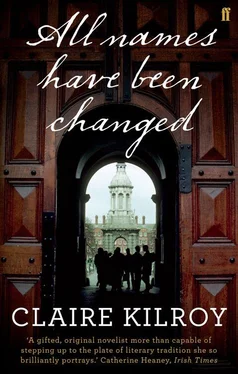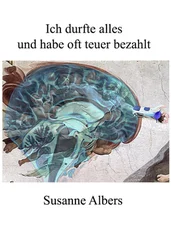Claire Kilroy - All Names Have Been Changed
Здесь есть возможность читать онлайн «Claire Kilroy - All Names Have Been Changed» весь текст электронной книги совершенно бесплатно (целиком полную версию без сокращений). В некоторых случаях можно слушать аудио, скачать через торрент в формате fb2 и присутствует краткое содержание. Год выпуска: 2010, Издательство: Faber & Faber, Жанр: Современная проза, на английском языке. Описание произведения, (предисловие) а так же отзывы посетителей доступны на портале библиотеки ЛибКат.
- Название:All Names Have Been Changed
- Автор:
- Издательство:Faber & Faber
- Жанр:
- Год:2010
- ISBN:нет данных
- Рейтинг книги:5 / 5. Голосов: 1
-
Избранное:Добавить в избранное
- Отзывы:
-
Ваша оценка:
- 100
- 1
- 2
- 3
- 4
- 5
All Names Have Been Changed: краткое содержание, описание и аннотация
Предлагаем к чтению аннотацию, описание, краткое содержание или предисловие (зависит от того, что написал сам автор книги «All Names Have Been Changed»). Если вы не нашли необходимую информацию о книге — напишите в комментариях, мы постараемся отыскать её.
All Names Have Been Changed — читать онлайн бесплатно полную книгу (весь текст) целиком
Ниже представлен текст книги, разбитый по страницам. Система сохранения места последней прочитанной страницы, позволяет с удобством читать онлайн бесплатно книгу «All Names Have Been Changed», без необходимости каждый раз заново искать на чём Вы остановились. Поставьте закладку, и сможете в любой момент перейти на страницу, на которой закончили чтение.
Интервал:
Закладка:
He consoled himself by gulping down what remained of the pint, then stooped to deposit the empty glass in a doorway rank with piss. He missed the pavement. The glass fell over and rolled into the gutter, where it shattered. Glynn looked away regally as if it were nothing to do with him, then unzipped his fly and contributed to the filth, the general squalor, the reeking cesspit that was Dublin City at night.
At the junction of Fleet Street and Westmoreland Street, the bould scribbler checked his watch only to discover that he wasn’t wearing one. He studied his bare wrist for a protracted period, then orientated himself to the right to contemplate the Liffey and O’Connell Bridge, leaning back as if this flat vista were a mountaintop of sublime proportions, too staggering to view at such close range. Whatever he saw placated him. Must have been the familiarity. The Mighty Glynn swayed gently, a man hearing strains of music on the breeze. There was a warm smell of hops on the air and he inhaled it deeply. His state of outrage appeared to have abated. He even seemed contented, briefly.
Glynn grunted and thought the better of going home. He consulted his bare wrist again, and it told him that the night was young. He turned his back on the river and set off in the opposite direction, making his way up Westmoreland Street with ostentatious care, raising his knees too high in the air as though the pavement were a flight of stairs. What a barrel he had become since gaining that extra weight over Christmas. Every pound of it had amassed around his middle, taut as a pregnancy, only higher. His limbs looked comically thin by comparison, shuttling up and down with the thirst. An awful cross to bear, the thirst, and Glynn a martyr to it. God knows, he wasn’t the worst off that night, and closing time wasn’t for another hour yet. It was the week before the annual deprivations of Lent, and the city’s drinkers were going at it hell for leather.
Outside the public toilets on College Street, Glynn collided with a group of young fellas dressed in silky tracksuits. Oblivious Glynn hadn’t been looking where he was going and couldn’t see more than a foot or two in front of himself in any case, having left his glasses on the pub table. He was blithely navigating his way to Bartley Dunne’s by ear when bang. The youths had colonised most of the public area, and the unexpected obstacle they presented sent the writer flying.
He reached for the nearest one to keep from losing his balance and caught the lad by the hips. Big mistake. The young fella shook him off with excessive force. ‘Get off of me, ya sick prick!’ he roared, ‘ya filthy puff, ya dirty bollocks, I’ll fucken burst ya!’ His friends goaded him on. ‘Fucken burst the poofter, go on.’ Several pedestrians turned around to detect the source of the commotion, but only so that they could avoid it. Nobody came to Glynn’s aid.
Aghast Glynn, blinking at finding himself in the centre of a ring of hooded teenagers who were baying words at him that he didn’t understand, was wholly at a loss as to how to respond. He stood beneath the statue of Thomas Moore, mouth agape, rocking on his heels, until the one he had allegedly molested stepped up to his face and hawked a big gob of spit into it.
Glynn crumpled before the teenager in a gesture of feudal submission, clawing the clotted fluid from his face as if it burned. ‘State a ya,’ the young fella pronounced in lofty judgement over the writer’s bent back. The rest of the youths laughed and congratulated one another on the calibre of the joke. Nice one, deadly, your man’s a fucken spa.
The writer in the end provided little sport, remaining crouched in a stained heap on the pavement. He wasn’t even worth a kick. The gang quickly lost interest in him. No, there was more to it than that: they quickly became embarrassed by him, keen to distance themselves from the grown man huddled into a ball, making a holy show of himself in the middle of College Street, clutching the back of his head as he rocked gently and gently moaned, the fucken bleedin mentler. Nothing to do with them.
Glynn slipped off once the gang moved on. He no longer merrily high-stepped but shuffled uncertainly forward, the heels of his hands pressed into his eye sockets as if they had been gouged. It seemed that he was crying, and maybe he was. Emotions had been running high all night.
He dodged a bus and made it to the other side of the street where he clamped a hand to a black rail of Trinity, holding on to it to steady himself like a commuter on a train. It took him some time to regain his composure. He was unused to such rough treatment, unaccustomed to interacting with people who made no allowance for his gift. A jewel glinting up from the bottom of a rock pool is a jewel only for so long as it remains there. Pry it from the mossy stones and it becomes a piece of broken glass once more. The same applied to the great writer. Out on the street, he looked like any tired civil servant trudging home from the office, any disappointed husband or bad father. Detached from the context of his staggering achievements, Glynn was just another old drunk in a city rotten with them.
Eventually he released the rail and struggled on, a swimmer submitting to the powerful currents of the street. He was swept around the corner with the flow of traffic from Pearse Street, all the time glancing fearfully over his shoulder. Indeed, he was being watched, but not by the little knackers. They had decamped to the Abrakebabra at O’Connell Bridge.
He headed not to the nearest pub, as might be forgiven under the circumstances, but straight back into the Republic of Trinity. He’d only lasted a few hours on the outside. This hasty retreat was an indication of just how thoroughly the attack had rattled him. He hadn’t seen it coming. Crime in the work of Glynn was perpetrated by the same old rogues and was thus predictable, manageable, even comical, part of the natural cycle of things. He depicted it almost as a form of tax, from which no one was exempt, except of course the artists.
No artists’ exemption was available to the professor in the wake of the assault on College Street. It had come from a quarter he barely knew existed. Glynn was essentially a man from a different era, although he hadn’t recognised it until that young fella stepped up to hawk a big gullier in his face. State a ya. Fucken bleedin mentler. The large wooden doors at the entrance to Front Arch had been bolted over at that hour, and Glynn had to step through the hatch cut into one of them. No gougers would gain admittance there; the night porter would personally see to it.
It was mercifully dark within the seclusion of the college walls, but not so dark as to be unapparent even from a few hundred feet away that Glynn was shaking hard. The flame he applied to his cigarette strobed with the tremble of his hand. From that distance, it could have been a firefly. He sought refuge under the Campanile. Glynn was now standing on the former site of the high altar of the All Hallows Priory, whether he knew it or not. The ruined priest at the ruined altar; it was a compelling image. On a better day, Glynn might have gotten a short story out of it.
He was invisible under there except for the glowing tip of his cigarette, which smouldered about his person like a tiny fiend. They were never far from his side, the demons. You couldn’t throw a stone. Glynn ventured out and wandered for a time between the statues of old provosts before settling down on a wet bench beneath a tree outside the Rubrics. The black and silver branches of the old oak were jewelled with glistening raindrops which splashed down on the great writer from time to time, though he didn’t seem to mind. He shook his head softly at his thoughts, which can’t have been happy, then checked his watch: still missing. It was ten past eleven.
Читать дальшеИнтервал:
Закладка:
Похожие книги на «All Names Have Been Changed»
Представляем Вашему вниманию похожие книги на «All Names Have Been Changed» списком для выбора. Мы отобрали схожую по названию и смыслу литературу в надежде предоставить читателям больше вариантов отыскать новые, интересные, ещё непрочитанные произведения.
Обсуждение, отзывы о книге «All Names Have Been Changed» и просто собственные мнения читателей. Оставьте ваши комментарии, напишите, что Вы думаете о произведении, его смысле или главных героях. Укажите что конкретно понравилось, а что нет, и почему Вы так считаете.












